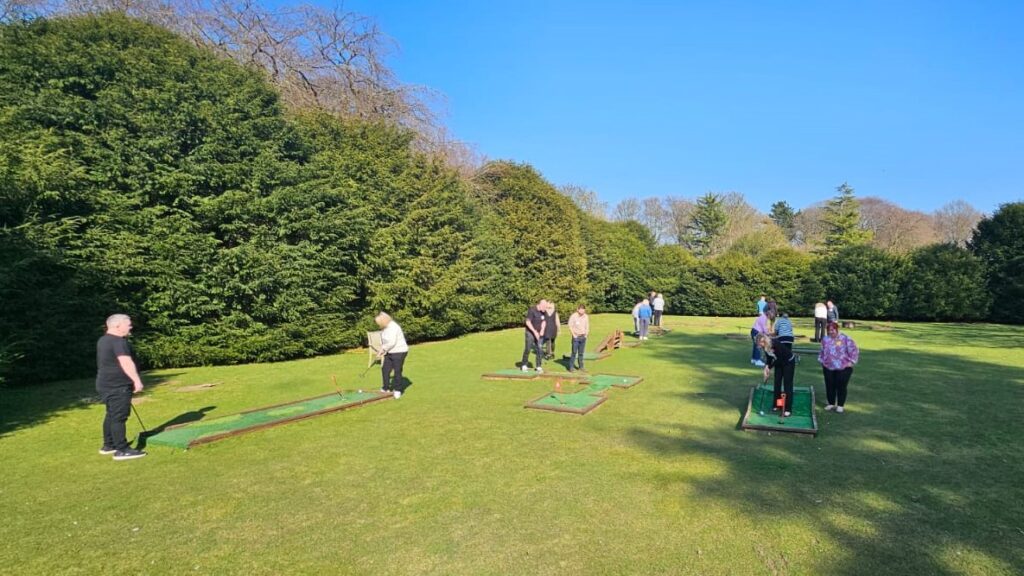If you’ve ever stood on the first hole of a crazy golf course, confident in your plan, only to find your ball ricocheting off a rogue ramp into a flower bed – you’ve experienced a small taste of systems leadership.
This is exactly what happened when Miova were working with a group of system leaders in Durham. We had a game of crazy golf together, which of course was a bit of fun, but the learning that emerged in terms of our systems leadership felt insightful and definitely worth a bit of further thought!
Working in systems is much more like crazy golf than you might think! Its unpredictable, playful, adaptive – and, at times, downright messy. And that’s okay. In fact, it’s necessary.
Following our experience in Durham, we’ve taken the lessons learned from the mini-golf course and explored how they map onto what systems leadership actually demands – from understanding complexity to leading with humility, resilience, and creativity.
Lesson 1: The Plan Will Change
In systems thinking, strategy isn’t fixed, it’s adaptive. The Cynefin framework (Snowden, 2007) reminds us that in complex systems, cause and effect aren’t obvious until after the fact. So, while it’s tempting to create a detailed plan, we must also create the conditions to sense, respond, and adjust as the system evolves. On the crazy golf course, colleagues were making a plan to slot the ball through a particular gap… it rarely happened, and the outcomes were almost never as expected.
In our work in Wakefield on Navigating Local Systems work, we began with a light-touch plan to support local partners in co-developing a physical activity approach. But as the system revealed itself, its relationships, assets, tensions, we adapted our approach, shifting to iterative relational engagement. The outcome? A stronger network and the blossoming conditions to enable change.
Lesson 2: Some Bits are Broken
Every system has weak spots. Sometimes it’s a broken ramp on hole six. Other times it’s a process, policy, or norm that no longer serves its purpose, but sometimes it feels like no one has permission to change it, to fix it. So, what happens… nothing. We all just keep spending hours writing those 30-page Overview and Scrutiny reports when a 2-page report and 3-minute video would have been much quicker and more impactful.
As Donella Meadows argued, effective systems change often requires working with (rather than against) the system’s constraints. In one place I worked recently, partners initially struggled with traditional council-led strategy models. We worked together to reframe the process as a collective expression of shared purpose. The result wasn’t just a plan – it was a co-created community-owned invitation to act.
Lesson 3: Progress Is Messy
The story of my life as a golfer…you don’t sink it on the first try. Systems change doesn’t happen in straight lines or neat phases. Instead, it’s iterative, emergent, and full of feedback loops.
That’s why our support to Sport England and the LGA has included learning experiences that honour the loopiness of progress – building in reflection, story-sharing, and ongoing adaptation. It’s why in North Wales, we’re helping partners test, tweak, and learn from place-based approaches, rather than rush to rollout.
As Peter Senge puts it: “Today’s problems come from yesterday’s solutions.” What matters is not getting it right first time but learning quickly and learning together.
Lesson 4: More Than Keeping Score
Success in systems leadership isn’t about hitting KPIs. It’s about seeing the deeper patterns – who’s at the table, what power dynamics are playing out, what stories are being told.
Evaluation in complex systems means noticing what’s changing beneath the surface. It’s about “learning while doing,” not just reporting after the fact. That can feel problematic, and it can test our patience. Finding the balance between the “story” and the “score” is key in managing the legacy mindsets of traditional linear problem solving. What works in understanding performance in solving complicated problems, simply doesn’t work in complexity.
Lesson 5: Pressure Changes How You Lead
Have you ever noticed how much harder it is to lead when people are watching and willing you to “finish the hole”? That pressure can make us tighten up, revert to old habits, or rush through decisions. Colleagues shared this whilst we were playing crazy golf. Before the group behind finished their hole quicker than us, it was more fun, and we were learning more. When they weren’t stood watching, waiting, desperate for us to finish so they could have their go.
That’s why we work with leaders, particularly those in the public sector, to develop confidence in uncertainty. We try to facilitate leadership spaces where it was safe to say, “we don’t know,” and where vulnerability becomes a strength, not a liability.
In systems leadership, the ability to stay calm, curious, and connected under pressure is just as important as strategic clarity. And it’s important as leaders to provide the support for progress, to create the conditions for change and avoid any sort of passive pressuring “when will we see progress” behaviour.
Lesson 6: Be Brave. Be Honest.
Real leadership in complexity is about showing your workings. It’s about experimenting openly and sharing what didn’t work, so others don’t waste time trying the same route. If you know the ramp on the left of hole 7 doesn’t work…, wouldn’t it be good to tell everyone else so they can try and alternative? Feels obvious, but not when the threat of competition rears its head.
As systems theorist Margaret Wheatley writes, “We can be fearless only when we remember that we belong to each other.” Honesty invites connection, and connection builds momentum for change.
Lesson 7: One Route Doesn’t Fit All
In crazy golf, what works on one hole won’t work on the next. Systems leadership is no different. Context is everything.
When working with the Youth Sport Trust, we co-developed a pilot in three schools, each in a very different place, with different challenges around absenteeism. The same leadership behaviours couldn’t be applied identically. Instead, we built a tailored blend of strengths-based coaching, co-production, and network-building to suit the local system.
As Otto Scharmer’s Theory U suggests, the role of the systems leader is to listen deeply to the context before acting. That’s how change gains traction.
Similarly, we’re all different. One of our Durham golfers was left-handed. He has a different perspective, different angle, different skill set and capability than everyone else. We needed his perspective and talents to help us see things differently and to model new approaches. Every leader, no matter their background, status, position or perceived power can bring understanding and value to the contextual understanding and plans to act.
Lesson 8: The Environment Shifts
No crazy-golf course stays the same. The wind changes. New obstacles appear. Someone leaves the gate open.
As systems leaders, we need to constantly scan the landscape. Like Wenger-Trayner’s “systems conveners,” we must operate at the intersection of the balcony and the dance floor – zooming out and diving in, repeatedly.
Lesson 9: Quick Fixes Cause Problems
When someone tries to whack the ball straight into the hole from a weird angle, it rarely ends well. In systems change, the temptation for simple linear fixes is strong—but can backfire.
We saw this in our work with young people from Muslim communities in Lancashire. Programme based, quick fix interventions weren’t working. It was only when we probed, understood, explored, got the right people to be having the right conversations that the transformational Active Madrassah work flourished.
As complexity scientist Dave Snowden argues, in complex systems we must “probe-sense-respond.” That’s why we encourage places to test light-touch ideas, notice what changes, and scale what’s working. It is also why Sport England’s work with places has moved through phases; pathfinding, accelerating and now deepening and expansion.
Lesson 10: Learning Happens Through Play
Finally, systems leadership isn’t just serious work, it’s playful work. When we loosen our grip on the perfect plan, we open up space for creativity, emergence, and joy.
That’s why our Miova approach includes creativity, reflection, and experimentation. From ripple-effect mapping to metaphor-based learning, from wheat mazes to paddle-boarding to crazy golf…. we try to help people make sense of complexity in ways that people can understand and apply. Metaphors and analogies bring meaning to theory, and games symbolise the deeper nuances of systems.
We’re serious about change—but we try not to take ourselves too seriously!
Systems change doesn’t require superhero leaders or flawless execution. It requires people willing to show up with courage, curiosity, and care. People who are okay with the occasional bump, miss, or re-do.
And if you ever need a little inspiration? Grab a putter. Head to the nearest crazy golf course. And remember it’s not about the hole-in-one. It’s about what we’re learning in the flowerbed!

